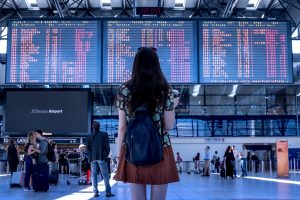
The covid-19 outbreak is first and foremost a human tragedy that is affecting hundreds of thousands of people. It’s also having a significant impact on the economy and our social fabric and global cohesion. Launching the right and effective measure is critical for the mid-term and long-term success of each nation.
Traditionally, transportation is an early indicator that reflects early on what the economy as a whole will be going through. Most of the world’s airlines could be bankrupt within 2 months because of the coronavirus, an aviation consulting firm is warning. “Airline bookings have ‘fallen off a cliff’ not seen since 9/11,” reports Business Insider. Airlines have axed flights and demand government action to help offset the financial impact, as they struggled to absorb Donald Trump’s travel ban to the US from Europe. Airline shares tumbled after the US announced it would block foreign nationals arriving from the EU Schengen zone, excluding the United Kingdom (UK). Airline shares are now down more than 50% in the last three weeks, according to The Guardian. The International Air Transport Association (IATA) fears that the move sees airlines go under. The BBC reports that the global association “warned on Friday that global airline revenue losses would be “probably above” the figure of $113bn (£90bn) that it estimated a week ago, before the Trump administration’s announcement of US travel curbs on passengers from much of continental Europe”.
The World Health Organization (WHO) has repeatedly stressed that it does not recommend that countries restrict travel or trade to prevent importation of covid-19. Countries not following the WHO’s advice, and implement non-evidence-based travel bans, do so in violation of the International Health Regulations — a legal framework that governs how countries should respond to international infectious disease outbreaks. Michael Ryan, executive director of the WHO’s emergency program, said that if member states impose unilateral trade and travel restrictions, it is a “recipe for disaster.” Nonetheless, countries are doing just that, reports the Washington Post.
Association of Flight Attendants-CWA president Sarah Nelson called the ban irresponsible. “There is no explanation for how this will help fight the spread of the virus,” she said. “It makes little sense when the virus is already in the United States.” The restrictions will hit foreign carriers like Lufthansa and Air France KLM that dominate the market for flights between continental Europe and the US.
The US’s unilateral move – disapproved by Brussels – will affect 13,500 flights and 4 million passengers in the next four weeks, according to data from the aviation analysts OAG. It will also impact global supply chains. Passenger planes carry more than 60% of air freight that moves between Europe and the U.S. Global air cargo fell by 2.7% in the first two months of 2020 compared with the previous year, with volumes originating out of China and Northeast Asia, including Hong Kong, down 7.3% and 7.8%, respectively, according to WorldACD.
This will cost jobs in continental Europe but also in the US. But more importantly, the measures are ineffective. This virus is moving too quickly and spreading too quietly even for experts to assume to know where in the different countries in the world the cases are. “Restrictive travel and trade measures have worsened the social and economic tolls of past events” writes the Washington Post. During the 2009 influenza pandemic, U.S. politicians’ fixation on the geographic origins of the pandemic did not serve the nation well, as countries began quarantining planes from North America. Additionally, more than 20 countries announced bans on U.S. pork imports in the mistaken belief that the virus could be spread by pigs, causing an estimated economic loss of $1 billion, according to the Washington Post.
15.7 million American jobs depend on travel, according to the president of US Travel Association Roger Dow. British Airways CEO Alex Cruz speaks about the survival of the flag carrier which is to ground flights ‘like never before’ and lay off staff. Willie Walsh, the CEO of International Airlines Group (IAG), and former CEO of Aer Lingus and British Airways defers retirement to tackle covid-19. IAG communicated that the spread of covid-19 and associated government travel restrictions were having a “significant and increasingly negative impact” on the demand for global air traffic on almost all routes. Norwegian Air said it was set to cancel 4,000 flights and temporarily lay off about half of its staff. American Airlines is expected to be the relative winner among the US carriers as its alliance with British Airways would work well flying passengers to the UK.
In the past “The run of bankruptcies has also created opportunities for stronger carriers to pick up planes, traffic and airport slots abandoned by collapsed rivals,” writes Reuters. However, less competition means also higher prices for consumers.
Priority is ensuring the heath of the citizens and travelers all over the world. The WHO shares recommendations to prevent infection spread for travelers in or from affected areas including regular hand washing, covering mouth and nose when coughing and sneezing, and avoiding close contact with anyone showing symptoms of respiratory illness.
Aviation is only one of the many sectors that are struggling. On Tuesday, March 17 2020, Martin Wolf writes in the Financial Times article “This virus is an economic emergency too’ that the covid-19 pandemic “is not just a threat to health. It may also be a bigger economic threat than the financial crisis of 2008-09. Dealing with it will require strong and intelligent leadership. Central banks have made a good start. The onus now falls on governments.”
Living up to the responsibility requires collective intelligence, effort and courage to execute timely and effectively. Loans will not suffice as they have to be repaid by highly distressed companies. Smarter solutions are required. The European Union (EU) suspension of slot use rules can only be the initial step on a steep path towards a probably challenging recovery journey ahead of us.


Leave a Reply